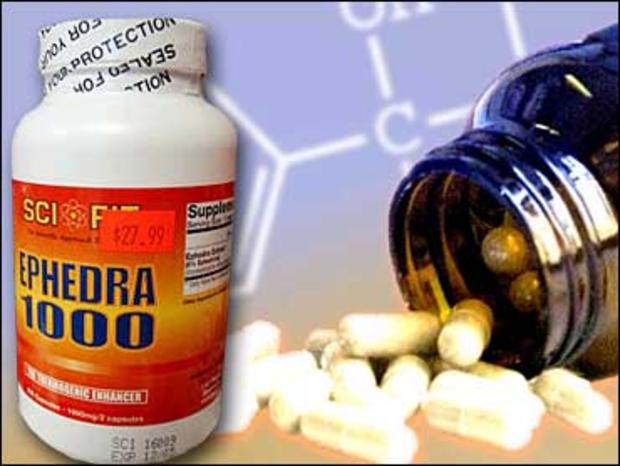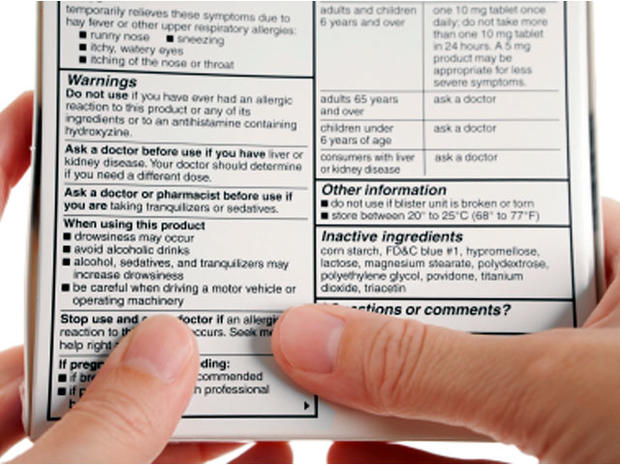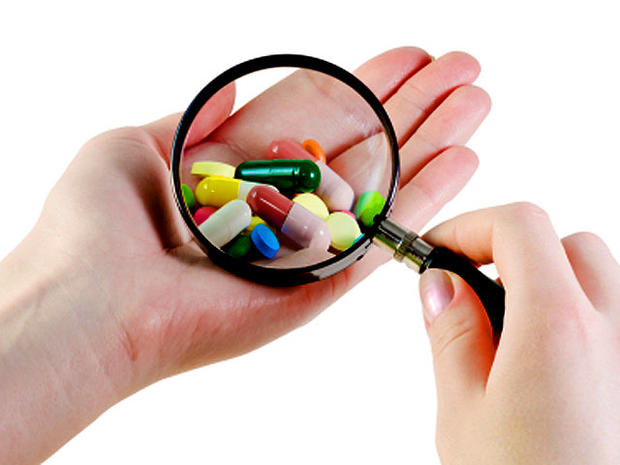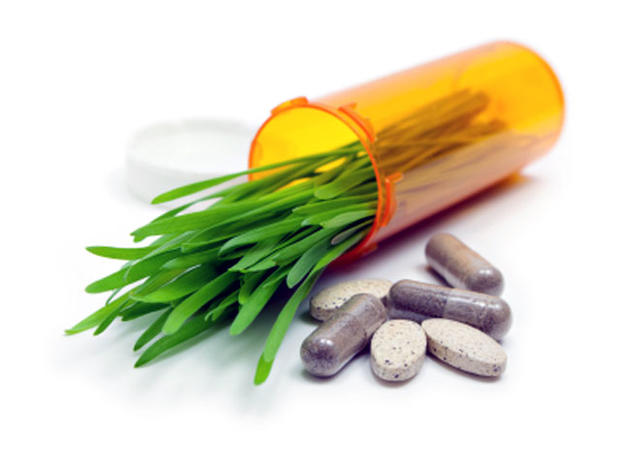Consumer Reports: 10 hidden dangers of vitamins
In its latest investigation, the consumer advocacy magazine conducted interviews, reviewed research and analyzed side effect reports submitted to the U.S. Food and Drug Administration's adverse event reporting program it obtained through a Freedom of Information Act request.
Are supplements as "natural" as the label says? Are claims of cancer prevention all they're cracked up to be? From Consumer Reports, here are 10 surprising dangers you - and the more than half of Americans who take supplements - may want to keep in mind next time you pop open that bottle...
Consumer Reports: 10 hidden dangers of vitamins
Supplements are not risk-free
The FDA however cannot easily take supplements off the market despite receiving these reports. To date, it has banned only one ingredient, ephedrine alkaloids (pictured), after a decade-long effort during which weight-loss products with ephedra were implicated in thousands of adverse events, including deaths.
How to protect yourself:
Go to the FDA website and type in the name of the supplement you're taking to see whether it has been subject to warnings, alerts or voluntary recalls. People having a bad reaction to a supplement should tell their doctor, and also report it to the FDA's adverse event system.
Consumer Reports: 10 hidden dangers of vitamins
Some supplements are actually prescription drugs
"A number of the spiked sexual enhancement products claim to work within 20 to 45 minutes," Dr. Dana Fabriucant, director of the FDA's division of dietary supplement programs, told Consumer Reports. "When we see a product that makes claims above and beyond what a dietary supplement might do - above supporting health - and within a time frame of a few minutes, it tips us off that we might have a spiked product."
How to protect yourself: Looking to lose weight? Try diet and exercise. Want to bulk up? Try weight training. And for those experiencing issues in the bedroom, see a doctor, since it could be caused by an underlying health problem such as diabetes, high blood pressure or kidney disease.
Consumer Reports: 10 hidden dangers of vitamins
You can overdose on vitamins
Too much vitamin A (in its retinol form) may lead to liver failure or even death, while pregnant women may risk birth defects. Overdoing vitamin D intake may lead to unhealthy weight loss, bone pain, vomiting, diarrhea and muscle problems.
A vitamin E overdose may increase a person's risk of bleeding, especially for those taking blood-thinning medication, according to Consumer Reports. Too much vitamin K may harm people with kidney or liver disease. An iron overdose from supplements could damage organ function, leading to death if untreated.
It's not very difficult to take more than a recommended dose either. For example, a woman worried about her bones might take a calcium supplement, a multivitamin that contains calcium and on top of that, she might eat calcium-fortified cereal with milk. In doing so, she will quickly approach the recommended daily calcium limit of 2,000 milligrams. Too much calcium may lead to kidney stones, says Consumer Reports.
How to protect yourself:
Add up your total daily supplement exposure - from foods or vitamins - and check with the Institute of Medicine for your daily recommended intakes to make sure you're not taking too much.
Consumer Reports: 10 hidden dangers of vitamins
You can't depend on warning labels
Supplements that contain iron must carry a warning about fatal poisoning in children, but otherwise the FDA doesn't require labels on supplements. However, some companies choose to put them on anyway.
Consumer reports reviewed the labels on 14 types of supplements - 233 products in all - from stores in the New York City area, and found major inconsistencies. Some supplement labels warned against unspecified drug interactions or taking while pregnant. Others warned about taking vitamins if you have a prior medical condition - but didn't specify the condition. Some labels mentioned there were possible side effects, without even detailing which ones.
How to protect yourself:
If you're taking other medication, make sure your doctor or pharmacist knows what supplements you are taking or thinking of taking. Or visit Consumer Reports for more information on 100 common supplements.
Consumer Reports: 10 hidden dangers of vitamins
No proof vitamins cure major diseases
Over the past decade, the Federal Trade Commission - the FDA's regulatory partner - has brought more than 100 legal challenges to advertising claims about the effectiveness of supplements.
How to protect yourself:
Visit reliable government websites including the FDA, the National Institutes of Health's Office of Dietary Suppplements and the National Center for Complementary and Alternative Medicine when researching supplements.
Consumer Reports: 10 hidden dangers of vitamins
Buy with caution from botanicas
When scientists analyzed the reporter's haul, they didn't find any relevant evidence on the plants' efficacy or safety, leaving Consumer Reports concerned. Experts also questioned the supply chain used by some of the stores to obtain the herbal ingredients, which may not meet industry standards.
How to protect yourself:
Check with your doctor before taking traditional herbs and make sure you know where they came from. If cultural health practices are important to you, visit an integrative physician who combines conventional medical treatments with holistic methods.
Consumer Reports: 10 hidden dangers of vitamins
Heart disease, cancer risk reduction from vitamins remain unproven
Consumer Reports cites a study in the June 11 issue of the New England Journal of Medicine that looked at 12,500 people with diabetes who were at risk for heart attack, and stroke found no differences in cardiovascular death rates between omega-3-takers and people taking a placebo.
When it comes to antoxidants like those found in vitamin A, C, E supplements, a study in the May 16 issue of the Journal of the National Cancer Institute found no protective benefits against risk for prostate or gastrointestinal cancers. In fact, the reasearchers wrote: "Some clinical trials show that some of these antioxidant nutrients may increase cancer risk."
How to protect yourself
The American Heart Association says that people who have coronary artery disease - a narrowing of the blood vessels that supply blood to the heart - may still want to talk to their doctor about omega-3 supplementation based on previous research. But most people can get enough omega-3s by eating fatty fish at least twice a week. If you want to reduce cancer risk, Consumer Reports says to "lay off the antioxidant supplements" and instead quit smoking, avoid excessive drinking and eat a healthy diet.
Consumer Reports: 10 hidden dangers of vitamins
Choking, esophageal irritation
While risk may be small, Dr. Joel Blumin of the American Academy of Otolayrngology - Head and Neck Surgery says it's a medical emergency that requires immediate intervention.
Blumin also told the magazine that pills may irritate the esophagus, creating a spasm that may cause the pill to be stuck, a sensation that feels like choking.
How to protect yourself
"Sometimes all you need is a second swallow or extra water to get the pill down," says Blumin.
What's the best way to make sure a vitamin goes down safely? Before taking a pill, moisten your mouth and throat with a swig of water. Then place the pill on the tip of your tongue, sip some water, tilt your head back and swallow. Drinking the remainder of the cup will help propel the pill down. If you frequently have problems swallowing pills, consult an otolaryngologist, also known as an ear, nose and throat doctor.
Consumer Reports: 10 hidden dangers of vitamins
"Natural" products may be anything but
The FDA says some products only contain synthetic copies of "botanicals" which don't even qualify as dietary supplements at all.
How to protect yourself
If you choose to take vitamins, botanicals or other supplements, look for those with the "USP Verified" mark, which means they meet standards of quality, purity, and potency set by the nonprofit U.S. Pharmacopeia.
Consumer Reports: 10 hidden dangers of vitamins
You may not need supplements at all
Vitamin A is found in eggs, liver and whole milk but even vegetarians can get a daily dose by eating five servings of produce, including green leafy vegetables, orange and yellow fruits. Most people get enough B vitamins through eating animal-derived products (although women who are pregnant or trying to get pregnant may want to consider taking folate acid to help prevent birth defects.
Vitamin C is not proven to prevent colds and too much of it could be dangerous for people who have hemochromatosis, a condition in which the body absorbs and stores too much iron. If you get some midday sun during the warmer months and eat vitamin D-rich foods, such as fatty fish, eggs and dairy products fortified with the vitamin, you probably don't need to take a supplement, according to Consumer Reports.
Vitamin E has been linked to a slightly but statistically significant increase in death risk. Large studies have found no evidence that multivitamins improve the health of the average person.
How to protect yourself
Do you eat fruits, vegetables, cereals, dairy and protein as part of your daily diet? Consumer Reports says there's little if any additional benefits from taking vitamins.










